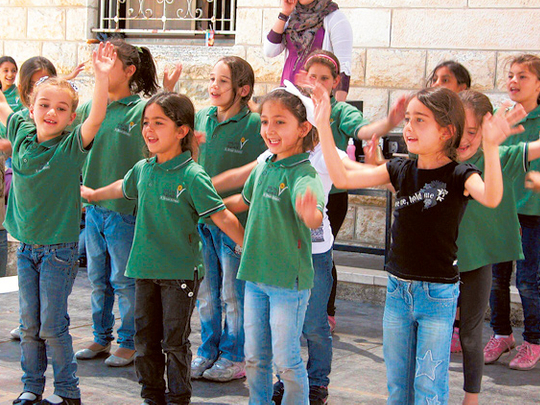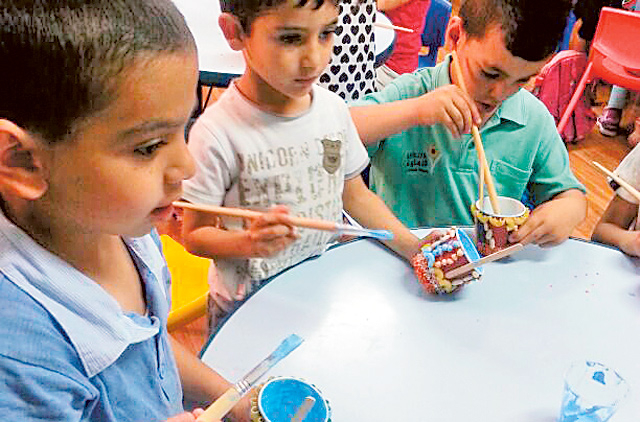
In occupied Jerusalem, education is one of the key elements of nonviolent resistance to the Judaisation and ethnic cleansing of the city. And Ahliya School, the first and now only Green School in Palestine, has opted to lead the way. Like all pioneering endeavours, though, it too is fraught with dangers and obstacles, more so because of where it is located and what it seeks to achieve.
Awni Zidani, the director of “Oloom Society”, an organisation for sustainable development and the umbrella body of the school, says: “Four years ago, a group of like-minded educationists contended that both public and private schooling were not preparing their children for the world they would be inheriting, so we opted to set-up a quality school instead.”
“We believed that our children would be ill-equipped if they attended public schools, missionary schools or even private schools, which today have about 40 to 50 students in classes, making them inefficient. And to avoid the pitfalls of private schools, we established an NGO.”
In the beginning, he said, “we faced the challenge of local business persons not being very keen to invest in the school for a whole lot of reasons and mainly because of the dire socio-economic plight of occupied Jerusalem. Then as an NGO we learnt there are unlimited funds available if we made it into an Islamic School, but to prepare our children for tomorrow, we seek to teach all religions, make it multicultural, multiethnic in order to fit the global context — and that is our dilemma.”
What makes the school a green school is a question Zidani answers passionately, “Alongside a standard primary school curriculum, we focus on environmental issues; we provide environmental lessons, which are just as important as Maths and Science. All of this, we do in the formative schooling years of a student. In the four years of our existence, we have made much progress in this respect.”
Zidani points out that their curriculum is very different from that of Palestinian public and private schools and the reason they did not opt for the Palestinian “Tawjeehi” curriculum is because of its failure. “Ours is taken from international curriculums and what distinguishes us is that extra curricula activities are part of it, for example, chess and music is part of it. Next year we shall add ethics and philosophy from kindergarten onwards.”
“However I must add that international environmental books have material that is not relevant for our experience, so we have had to adopt and localise it. For example, some northern countries are concerned about global warming and their polar bears. In our case, we have focused on certain species of birds and the effect of climate change on their survival as well as the environmental damage that result from the building of the separation wall by the Israelis.”
Zidani is focused on the output aspect of education and explains, “Our intention is to have open-minded students who can challenge the status quo, whereas today’s schooling system, inherited from the British colonial system, ‘Tawjeehi’, does not prepare children for the real world, with rote learning and no critical thinking or analysis.”
On the question of school fees and costs for parents, Zidani says, “Our tuition fee is less than that of private schools, and I must stress that we are an NGO and not a business for profit, as the private schools are. At present we have 140 children and we cater from kindergarten to grade one, with the intent to grow all the way to grade six, but our expansion is limited by the size of our building, although we have hundreds of children from marginalised Palestinian families on our waiting lists.”
“Our classes average in size between 12 and 15 and we have 14 teachers, all from occupied Jerusalem, of which four are part-time and this is very different from public and private schools whose classes are huge with the teaching suffering as a result.”
Zidani talks passionately about the challenges they face and their steadfast determination in trying to sustain their vision and dream. “Our landlord lives on the upper floors and our rent and salaries make up the highest expenses in our budget. Breaking it down, 70 per cent constitute salaries, and the balance is rent and running costs. We seek volunteers and we are aware that international donors will not service our running costs. Our deficit, for now, is covered by loans from businesspersons and small grants locally. That helps us tide us through these difficult times.”
Zidani says they too are victims of the Israeli occupation of Jerusalem, its systematic ethnic cleansing of Palestinians. “As building space is limited, we are forced to pay exorbitant rentals.” Matters are compounded by the fact that parents who pay their children’s schools fees by cheque, oftentimes cannot honour them. “We have the option of kicking their kids out or referring them to the Israeli legal system, but we feel they are like our own children and do neither,” he says.
The government schools and the educational siege they face is part of the policy to ethnically cleanse Palestinians from Occupied Jerusalem, Zidani says. “They need 1,500 classes to seat an average of 30 students and as a result of this dire need, have a high dropout rate from Grade 9, of between 35 to 50 per cent, one of the highest in the modern world, with most going to work for the Israelis as blue collar workers in their restaurants and factories. Some even leave occupied Jerusalem altogether subject to the pressures of families to provide bread on their tables.”
Zidani, nevertheless battles on, saying: “We aim to grow and move to larger premises and we are inspired by noting our children succeed in competitions, especially English and chess as well as ‘origami’ art, which develops their sense of imagination. Initially, the project was created to fill a gap in occupied Jerusalem and we believe that if other schools are interested in adopting a green school curriculum, we are amenable to cooperation.”
Zidani emphasises that they are there to provide a safe space to children from impoverished backgrounds, from single parent households, of refugee status and those unable to receive state education. “Furthermore,” he says, “our aim is to teach the values of religious tolerance to Palestinians who are both Muslims and Christians. Not to forget, we also raise awareness about gender issues, which is a major obstacle for social change, as Palestinian women suffer from a double oppression, that is, the Israeli occupation and the traditional tribal and patriarchal social system.”
And Zidani wraps it all up by stressing, “Most importantly, we are developing leadership skills for a new generation of Palestinians.”
The Ahliya School is in its infancy and certainly green, in a very harsh and hostile environment. The challenge it faces is of survival and growth to its full potential — which is quite like what everyone who lives, works and tries to make a life in occupied Jerusalem does on a daily basis.
–Rafique Gangat, author of Ye Shall Bowl on Grass, is based in occupied Jerusalem



